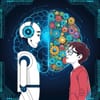A recent study by McGill University and Mila, the Quebec Artificial Intelligence Institute, has shed new light on the diagnosis of autism. By analyzing over 4,200 clinical reports of children in Quebec using large language models, the researchers found that traditional diagnostic criteria may not be as effective as previously believed.
The study revealed that criteria related to socialization, such as emotional reciprocity and nonverbal communication, were not as indicative of autism as previously thought. Instead, repetitive motor movements, hyperfixation on certain interests, and unusual sensitivity to sensory stimuli were found to be strongly associated with an autism diagnosis.
These findings suggest that the medical community may need to reconsider the importance placed on current diagnostic criteria. Establishing an autism diagnosis currently relies on clinical evaluation, which can be a lengthy process, and there is no biological test to analyze genes, blood, or brain images.
The study's results have significant implications for the diagnosis and treatment of autism. By leveraging artificial intelligence, healthcare professionals may be able to provide more accurate diagnoses and interventions, ultimately improving outcomes for individuals with autism. AI could refine the diagnostic process, making it faster and more accurate, and complement the work of expert panels and human judgment.


